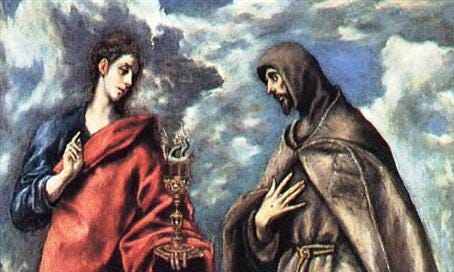Anyone who has seen The Chosen – a series that isn’t perfect, but is perfectly wonderful – may note its depiction of St. John the Evangelist as a bit of a spoiled brat.
There’s something to this: Even beyond the maternal power play in Matthew 20, we can see the rivalry among Jesus’s “sons” between the lines of the Gospels, and John certainly earned his name “son of thunder” in his response to the Samaritans’ mockery of Jesus.
But whatever of the reputation John has of being spoiled and selfish comes from his self-reference as “the disciple whom Jesus loved” is unjust. The assumption is that he’s making a claim of superiority, as if to say, “He loved me more than the others.” But there’s nothing to prove this interpretation.
Just as likely, John self-identifies as “the disciple whom Jesus loved” the same way John the Baptist, his mentor, self-identified as “a voice crying out in the wilderness” and “the friend of the Bridegroom.” These titles interpret John the Baptist’s vocation, the nature of his relationship with God. He has understood his life of fidelity through certain lenses, the nature of which he has discerned through personal experience.
But these titles, while they specify his life of fidelity to God, do not exalt him above others. There is a reason why pre-Tridentine Catholicism emphasized St. John the Baptist as the model male disciple, especially in the case of the clergy. John’s self-identifications are not exclusive, but invitations to others to follow after his example. Hence, each of us – especially those called to orders – must strive to identify ourselves as “a voice crying out” and “friend of the Bridegroom.”
Might not John the Evangelist’s self-identification function likewise? Might he not wish that each of us could examine God’s work in our lives and so realize that – just like him – the core of Christian identity is to be “the disciple whom Jesus loved”? Even as Paul said, The life I now live in the flesh I live by faith in the Son of God, who loved me and gave himself for me (Gal 2:20).
St. Francis of Assisi understood this. The experience of Christ crucified – both at San Damiano and in the stigmata – seared the love of God deeply into his heart. Thus armed, he was able to face anything without a care, becoming in turn “a voice crying out” and “friend of the Bridegroom,” because he was “the disciple whom Jesus loved.”
How much would our Christian lives change if we looked back and received again the experiences that formed our faith, that convinced us that Jesus is the Son of God present in his Church, and let them form the core of our identity? Might this not be one of the deepest messages of the Christmas season, in which St. John’s feast finds itself situated? The season of gift-giving is meant to emphasize God’s freely given gifts to us, as little deserved as anything under the Christmas tree.
I am “the disciple whom Jesus loved” because “He loved me and gave himself for me.” I know this because he has, in many ways, made this love clear to me. It would be as easy to deny this love as it would be to deny anything else in my personal history. Can each of us say this with enough confidence? St. John invites us to discover this love, and not only to live it, but to be it.





